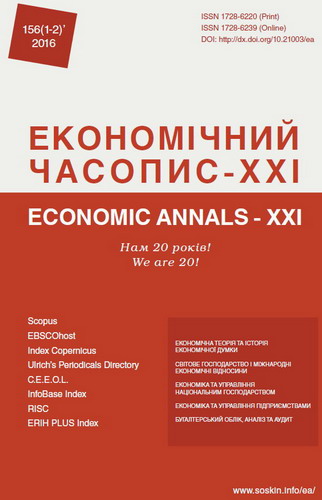Corporate income tax: evolution, problems and possible solutions
Corporate income tax: evolution, problems and possible solutions
Author(s): Tetiana Paientko, Kateryna ProskuraSubject(s): Economy
Published by: Institute of Society Transformation
Keywords: Income; Corporate Income Tax; Tax Base; Tax Rate
Summary/Abstract: Corporate income tax is one of the most important taxes in acquiring government revenue and fiscal regulation of economic activity. Corporate income tax in Ukraine has low fiscal and regulatory efficiency. The methods of corporate taxation used in Ukraine are constantly changing. Many of those changes have not had a positive influence on taxation and economic growth because the equilibrium between interests of the government and taxpayers is not maintained. The aim of this paper is to identify existing problems and propose ways for improving the taxation of corporate income in the context of balancing the interests of taxpayers and the government. Historical and trend analyses were used as methods in this paper. The process of evolution of corporate income taxation in Ukraine can be divided into several stages, each of them having an influence on income taxation. At the first stage, the object of income taxation changed several times during the year in order to increase the fiscal efficiency of the corporate income tax. It caused a negative reaction from businesses, and as a result many businesses moved into the shadow economy of Ukraine. At the second stage, a large number of tax exemptions and exceptions were applied. Most of the exemptions and exceptions were given for special interests without proper controls, and were not meant to stimulate investment. These benefits were granted for an unjustifiably long period, and the excess profits derived from this preferential taxation were not directed at reinvestment in industries, but were distributed among the new owners. As a result, outdated technological structures were not improved. This is one of the reasons why they are not competitive today, both internationally and in the domestic market. At the third stage, various types of tax incentives were regularly introduced. Their introduction was for a period of short duration. In particular, preferential mechanisms of income taxation for special economic zones, priority development areas, and technoparks were designed. On the whole, the idea of preferential taxation of these entities was aimed at stimulating economic development in depressed regions and boosting economic innovation. Despite the fact that this idea had had success in many developed countries, it did not work in Ukraine, mainly due to the fact that those who had income tax exemptions used them for the construction of tax evasion schemes. Between 2010 and 2014, the tax base moved closer to being calculated on financial results according to accounting data, and revenues and expenses began to be recognised on the accrual principle. Despite significant progress in changing the object of income taxation, the system of income taxation which was in force at that time retained significant differences relevant to the taxation of income from securities transactions, taxation of banking institutions, insurance companies and collective investment institutions. At the beginning of 2015, the mechanism of accrual and payment of income tax changed radically again. Today, taxes are determined according to data of financial accounting in accordance with the National Provisions (Standards) of Accounting (P(S)A) or International Financial Reporting Standards (IFRS). However, a number of differences were identified between the two methods of accounting to which the object of income taxation has to be adjusted (tax adjustments that may increase or decrease the object of corporate income taxation). The changes in corporate income taxation did not take into account the necessity of a balance of interests between the government and taxpayers. In general, those changes were made to increase fiscal efficiency. It is necessary to improve the mechanism of corporate income taxation to find the equilibrium between the interests of the government and taxpayers. It could be possible if the government develop a long term economic strategy based on the welfare economic theory.
Journal: Економічний часопис - ХХІ
- Issue Year: 156/2016
- Issue No: 01+02
- Page Range: 44-48
- Page Count: 5
- Language: English

